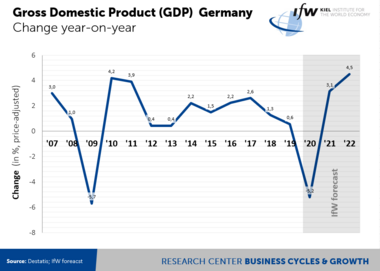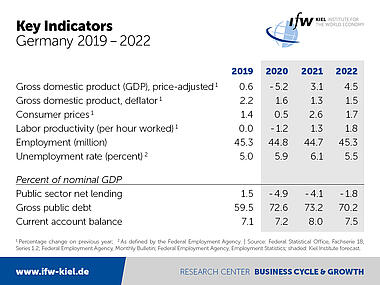News
Kiel Institute Economic Forecast: Recovery Postponed but not Cancelled

"In the final quarter of 2020 and the first quarter of the new year, GDP is expected to contract due to anti-pandemic restrictions imposed since November. In macroeconomic terms, this is a setback for the recovery process, but not a relapse into a crisis like last spring," said Stefan Kooths, head of forecasting at Kiel Institute, on the occasion of the presentation of the Institute's winter forecast. "While contact-intensive, mostly consumer-oriented service sectors face a tough time until next spring, the manufacturing industries will be much less affected - thanks to relatively robust export opportunities."
In line with the overall trend, the recovery on the labor market will also be delayed. As a result, the average unemployment rate for 2021 will rise to 6.1 percent, slightly above the previous year's figure (5.9 percent). By October, an estimated 860,000 jobs had been lost as a result of the crisis. Those employed exclusively on marginal wages are by far the hardest hit, a group that us not entitled to short-time working benefits due to the lack of compulsory social insurance. The partial shutdown since November and the tightening of measures in mid-December are likely to cause short-time working to rise again while employment falls; however, the extent of this is likely to be significantly lower than in spring. Towards the end of 2021, the recovery in employment should gain momentum. According to the Kiel Institute forecast, the unemployment rate will fall to 5.5 percent in 2022.
The governmentbudgets will be additionally burdened on the revenue side by the economic weakness and on the expenditure side by further aid packages. The Kiel Institute’s researchers now expect a deficit of 4.9 percent in relation to GDP for 2020. Despite the second wave, the deficit will thus remain below the 5.1 percent still expected in the fall because corporate support programs have been drawn down to a much lesser extent than planned. Next year, however, the deficit will be 4.1 percent, significantly higher than previously expected (3.1 percent), and will fall to 1.8 percent in 2022, provided the expected upswing materializes during the course of next year. According to the researchers, the federal government and the vast majority of the Länder will then be able to comply with the debt brakes again.


Export-oriented German companies are benefiting from the upturn in the global economy. In the third quarter, the global economy made up a considerable part of the decline in production levels suffered in the first half of the year. Although this trend is currently being slowed by measures to contain the second wave of infection, overall global production remains on an upward trend with China’s strong economic momentum playing an important role. By contrast, gross domestic product in Europe is expected to decline again in the fourth quarter. Unlike in the spring, so far, no serious negative effects of the pandemic on manufacturing output, international trade and raw material prices show up in the data. Due to the negative impact of tighter anti-corona measures in particular on the service sectors in several parts of the world, the Kiel Institute researchers have reduced their forecast for global economic output in 2020 by 0.2 percentage points and for 2021 by 0.6 percentage points compared with the fall forecast published in September. A 3.8 percent slump in the current year now contrasts with a 6.1 percent rebound next year.
"The pandemic is currently outshining everything else in terms of economic activity. This also means that a successful containment of the pandemic will have a significant positive impact on the outlook for next year. We were already able to observe last summer how strongly the economy comes back when shutdowns are lifted. Policymakers can best support the recovery with a clearly communicated pandemic strategy and targeted support programs that shelter corporates’ equity buffers from being eroded by the Covid-19 crisis," said Kiel Institute President Gabriel Felbermayr.
